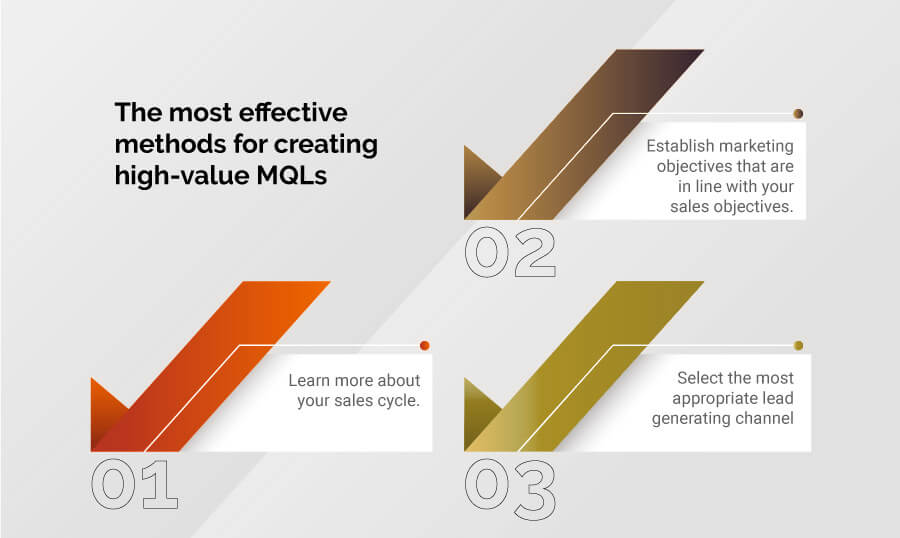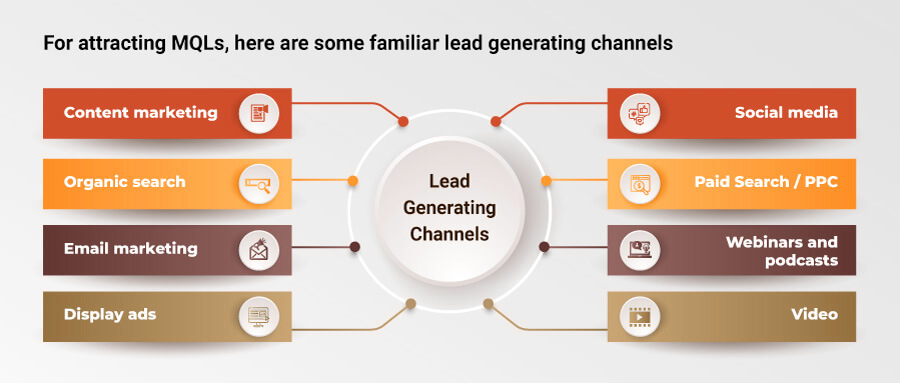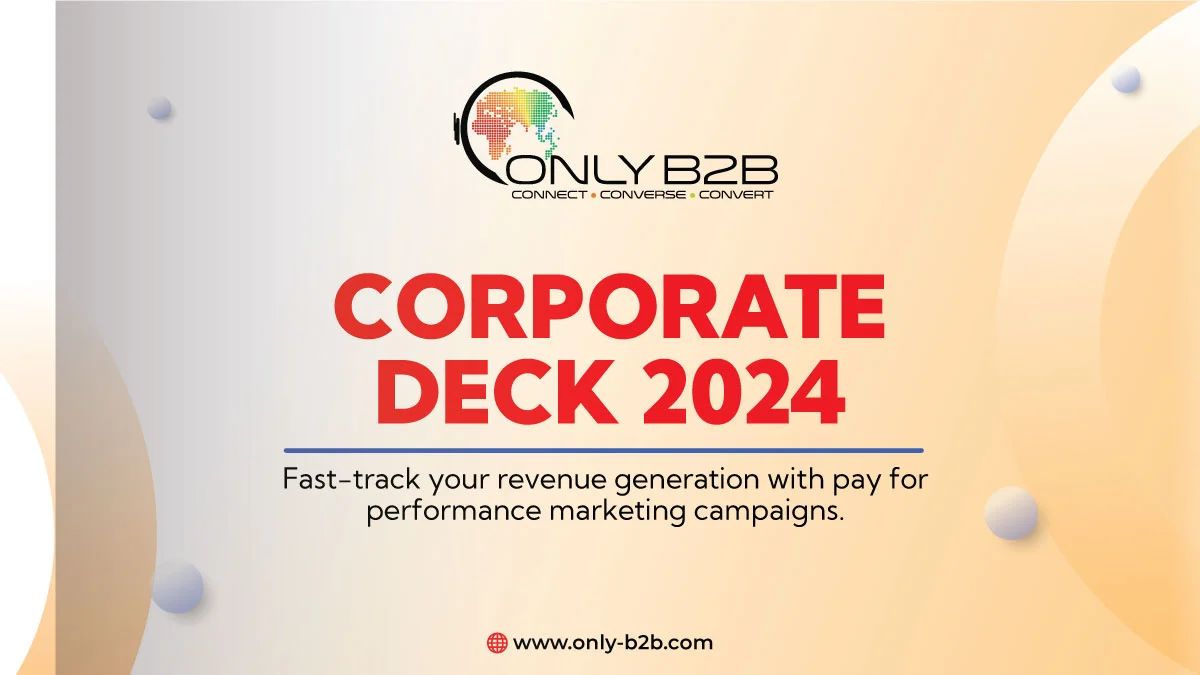
In the ever-evolving landscape of B2B marketing, where competition is relentless, and digital marketing strategies continuously shift, the importance of Marketing Qualified Leads (MQLs) stands out like a guiding light.
MQLs represent more than just prospects; they embody potential customers who have ventured deeper into your sales funnel, demonstrating a keen interest in your products or services.
In this blog, we will navigate the realm of MQLs, exploring their pivotal role in B2B lead generation and unveiling strategies to not only generate more leads but also to nurture and convert them into loyal, revenue-generating clients.
Generating More Qualified Leads with MQLs: A Pathway to B2B Success
Table of Contents
- 1 Generating More Qualified Leads with MQLs: A Pathway to B2B Success
- 2 How to Generate More Qualified Leads with MQLs

What Is Marketing Qualified Leads (MQLs)?
Marketing Qualified Leads (MQLs) are the essential bridge connecting marketing efforts with sales endeavors.
These prospects have engaged with your brand in substantial ways, such as subscribing to newsletters, downloading valuable resources, visiting your website, or actively participating in webinars.
Their actions signal a genuine interest in your offerings, making them prime candidates for conversion into customers.
Must Read: MQL Criteria: Identifying Potential Customers Effectively
Why Are MQLs Important for B2B Lead Generation?
Skyrocketing Conversion Rates:
MQLs exhibit significantly higher conversion rates compared to raw leads. According to Gleanster Research, a whopping 73% of all B2B leads are not sales-ready, underscoring the critical role of nurturing leads into MQLs.
Optimized Sales Efforts:
By focusing on MQLs, your sales team can channel their efforts toward prospects who not only demonstrate interest but are also more likely to make a purchase.
This streamlined approach reduces the time and resources spent on unqualified leads, resulting in more efficient and cost-effective sales processes.
Maximized ROI:
MQL-focused strategies translate into cost-effective endeavors. By investing your resources in leads with a higher likelihood of conversion, your business can achieve a higher return on investment (ROI).
Sustainable Long-Term Value:
MQLs often evolve into loyal customers who provide repeat business, referrals, and sustained revenue. This not only bolsters your bottom line but also ensures a robust Customer Lifetime Value (CLV).
Must Read: Inbound vs. Outbound Lead Generation: Finding the Right Mix for MQLs
Benefits of Generating More Qualified Leads
Revenue Surge:
The primary objective of any lead generation strategy is to drive revenue growth. Generating more MQLs guarantees a steady stream of promising leads to nurture and convert into paying customers.
Streamlined Sales Cycle:
MQLs are already educated about your products or services and have expressed genuine interest. Consequently, the sales cycle is significantly shortened, allowing for quicker revenue realization.
Enhanced Customer Retention:
Satisfied MQLs are more likely to remain loyal to your brand, increasing customer retention rates and diminishing the constant need for aggressive customer acquisition efforts.
Informed Decision-Making:
The process of generating and tracking MQLs provides invaluable insights into the preferences and behaviors of your target audience. This, in turn, facilitates data-driven decisions that refine your marketing strategies for optimal results.
Must Read: MQL to SQL Conversion Rate
Now, let’s delve into actionable strategies for generating more qualified leads through MQLs:
How to Generate More Qualified Leads with MQLs
A. Create Buyer Personas
Understanding Your Audience:
Generating MQLs commences with the creation of comprehensive buyer personas. These personas serve as detailed profiles of your ideal customers, encompassing demographics, pain points, goals, and preferences.
Understanding your audience at this level enables you to tailor your marketing endeavors to resonate with their needs and aspirations.
Tailored Content:
Once you’ve developed buyer personas, the next step is to create content that directly addresses their pain points and aspirations.
Whether it’s blog posts, eBooks, whitepapers, or webinars, your content should be highly tailored, providing valuable solutions to your audience’s unique challenges.
Research conducted by Demand Metric reveals that content marketing generates three times more leads than traditional outbound marketing and costs 62% less.
Must Read: How to Leverage Account-Based Marketing (ABM) for Marketing Qualified Leads
B. Develop Targeted Content
Personalized Approach:
One-size-fits-all content is a relic of the past. In the current landscape, personalization reigns supreme. Your content must speak directly to the pain points, needs, and aspirations of your buyer personas.
This personalized approach positions your brand as a valuable resource, attracting MQLs who resonate with your content.
Consistency Across Channels:
Ensuring a consistent message across all marketing channels, from your website and social media to email campaigns, is essential. A cohesive brand voice and message build trust and familiarity with your audience, reinforcing your brand’s authority.
For attracting MQLs, Here are some familier lead generating channels:

Must Read: Important Ways To Generate Marketing Qualified Leads
C. Use Lead Magnets to Capture Contact Information
Offering Value:
Lead magnets are incentives offered to prospects in exchange for their contact information. These incentives can take the form of eBooks, whitepapers, webinars, templates, or free trials.
By offering valuable resources, you not only capture MQLs but also showcase your industry expertise. This builds trust and positions your brand as an authority in your field.
Permission Marketing:
Lead magnets align with the principles of permission marketing. In this approach, prospects willingly provide their contact information in exchange for valuable content.
This not only generates MQLs but also ensures that these leads are genuinely interested in your offerings.
Must Read: How to Personalize Your B2B Marketing for Better Results
D. Nurture MQLs with Personalized Messaging
Lead Scoring:
Implement a lead scoring system that assigns values to various lead attributes and behaviors. For instance, a lead who downloads a product demo might have a higher score than one who merely visits your website.
This allows you to prioritize your efforts, focusing on high-scoring MQLs who are more likely to convert.
Drip Email Campaigns:
Email remains a powerful tool for nurturing MQLs. Develop drip email campaigns that deliver personalized content based on the prospect’s behavior and interests.
According to a study by Marketo, personalized emails generate up to six times higher revenue per email than non-personalized emails.
Must Read: How to Optimize Your Inbound Lead Qualification Process for 2024
E. Qualify MQLs and Pass Them to Sales
Scalable Automation:
Utilize marketing automation software to streamline the lead nurturing process. Automation enables you to score leads, segment them based on their behavior and engagement, and deliver personalized content efficiently.
Effective Communication:
Establish clear communication channels between your marketing and sales teams. Define the criteria that qualify an MQL as a Sales Qualified Lead (SQL), ensuring that your sales team focuses its efforts on leads that are genuinely ready for conversion.
Conclusion
In the competitive landscape of B2B lead generation, mastering the art of generating Marketing Qualified Leads (MQLs) is not just a strategy; it’s a roadmap to sustainable success.
While some may confuse MQLs with Sales Qualified Leads (SQLs) or even High-Quality Leads (HQLs), understanding the distinctions is crucial. MQLs represent a vital step in the nurturing process, ensuring leads are sales-ready and primed for conversion.
By creating buyer personas, developing targeted content, using lead magnets, nurturing MQLs with personalized messaging, and implementing lead scoring, businesses can not only generate more leads but also convert them into loyal customers.
The benefits are compelling: higher conversion rates, focused sales efforts, enhanced ROI, and a sustainable source of revenue. By optimizing your lead nurturing process and focusing on high-quality leads, you can significantly improve your lead-to-MQL conversion rate, ensuring a steady stream of qualified prospects for your sales team.
MQLs are not just potential customers; they are your brand advocates, loyal supporters, and the lifeblood of your B2B success.
So, as you embark on your journey of B2B lead generation, remember that the true power lies in quality over quantity. It’s not just about generating more leads; it’s about generating the right leads – the MQLs that will drive your business to new heights.
Must Read: MQL vs. SQL: Which Lead Matters More and When?

Vikas Bhatt is the Co-Founder of ONLY B2B, a premium B2B lead generation company that specializes in helping businesses achieve their growth objectives through targeted marketing & sales campaigns. With 10+ years of experience in the industry, Vikas has a deep understanding of the challenges faced by businesses today and has developed a unique approach to lead generation that has helped clients across a range of industries around the globe. As a thought leader in the B2B marketing community, ONLY B2B specializes in demand generation, content syndication, database services and more.


